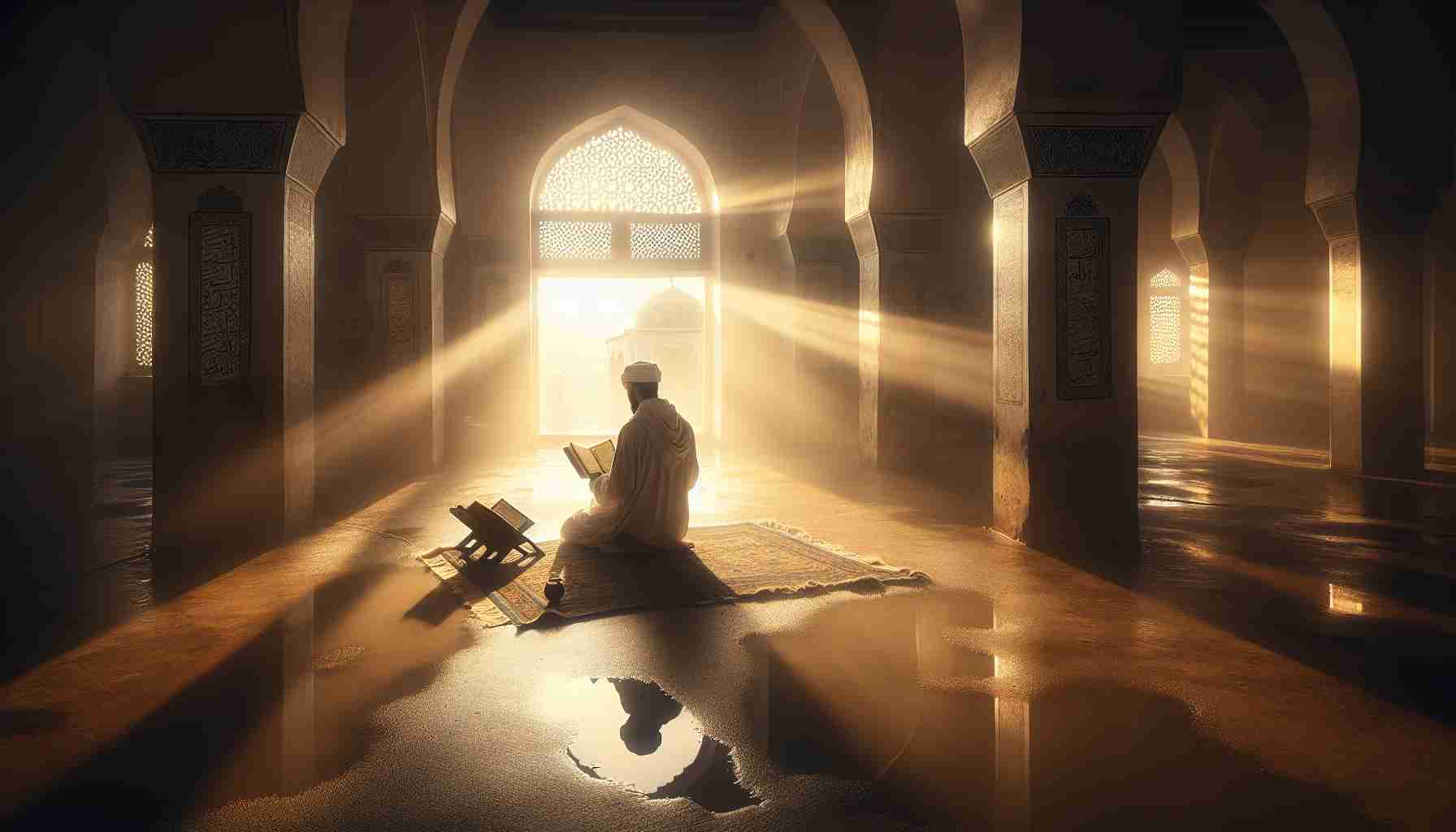

I hadn’t touched my prayer mat in weeks. It still lay folded at the corner of my room, beside a dusty copy of the Qur’an I kept telling myself I’d read "tomorrow." Tomorrow had turned into months.
The days blurred together—wake, work, screen, sleep. I went through them like a ghost, every heartbeat echoing a question I couldn’t answer: Where did I go wrong?
Nothing dramatic had happened. No catastrophe, no heartbreak. Just this slow erosion. Like a canyon carved by silence.
And I was tired—of pretending, of pushing through with numb devotion, of wondering if Allah was still listening.
Then came the storm.
It was a Wednesday afternoon when an unexpected downpour swept over the city, drowning everything in gray. The kind of rain that stops traffic, that makes you notice the rhythm of each drop. I looked out the window as the storm pelted against the glass, my tea growing cold between my hands, and I heard it—really heard it.
The silence wasn't absence. It wasn't Allah ignoring me. It was space. An invitation.
Something softened.
I don’t remember walking to my prayer mat—I just found myself kneeling there, forehead pressed down, the tears lowering me deeper than the earth.
I didn't know what to say. I just wept. Letting my salah be a conversation made of silence and salt. And somehow, that was enough.
It wasn’t like the darkness lifted in that one moment. Nothing suddenly became perfect. But something shifted.
For the first time in a long time, I felt seen. Not by the world, not even by myself. But by the One who never stopped watching over me, even when I had turned away.
I began praying again. Not perfectly, not always on time. But I kept showing up. Even when my heart felt dry as sand.
I whispered duas into my pillows—prayers not shaped by eloquence but by ache. Some nights, they were just soft admissions: I miss You. Help me find my way back.
And strangely, the world responded.
One morning, a child at the store smiled at me with a grin missing three teeth and handed me a crushed dandelion. “It’s for you,” she said.
A few days later, I passed an old masjid on my walk home. I'd forgotten it was there. I paused. The doors were open. The adhan floated out like a memory.
My knees remembered how to bend. My heart remembered how to hope.
I left my phone more often. Sat in the stillness. Watched late afternoon light filter through the blinds and thought: Even cracked windows can let in the sun.
It’s slow, this rebuilding.
But it’s real.
And mercy?
It’s quieter than I thought.
Less like lightning. More like rain.
—
Qur’an & Hadith References:
I hadn’t touched my prayer mat in weeks. It still lay folded at the corner of my room, beside a dusty copy of the Qur’an I kept telling myself I’d read "tomorrow." Tomorrow had turned into months.
The days blurred together—wake, work, screen, sleep. I went through them like a ghost, every heartbeat echoing a question I couldn’t answer: Where did I go wrong?
Nothing dramatic had happened. No catastrophe, no heartbreak. Just this slow erosion. Like a canyon carved by silence.
And I was tired—of pretending, of pushing through with numb devotion, of wondering if Allah was still listening.
Then came the storm.
It was a Wednesday afternoon when an unexpected downpour swept over the city, drowning everything in gray. The kind of rain that stops traffic, that makes you notice the rhythm of each drop. I looked out the window as the storm pelted against the glass, my tea growing cold between my hands, and I heard it—really heard it.
The silence wasn't absence. It wasn't Allah ignoring me. It was space. An invitation.
Something softened.
I don’t remember walking to my prayer mat—I just found myself kneeling there, forehead pressed down, the tears lowering me deeper than the earth.
I didn't know what to say. I just wept. Letting my salah be a conversation made of silence and salt. And somehow, that was enough.
It wasn’t like the darkness lifted in that one moment. Nothing suddenly became perfect. But something shifted.
For the first time in a long time, I felt seen. Not by the world, not even by myself. But by the One who never stopped watching over me, even when I had turned away.
I began praying again. Not perfectly, not always on time. But I kept showing up. Even when my heart felt dry as sand.
I whispered duas into my pillows—prayers not shaped by eloquence but by ache. Some nights, they were just soft admissions: I miss You. Help me find my way back.
And strangely, the world responded.
One morning, a child at the store smiled at me with a grin missing three teeth and handed me a crushed dandelion. “It’s for you,” she said.
A few days later, I passed an old masjid on my walk home. I'd forgotten it was there. I paused. The doors were open. The adhan floated out like a memory.
My knees remembered how to bend. My heart remembered how to hope.
I left my phone more often. Sat in the stillness. Watched late afternoon light filter through the blinds and thought: Even cracked windows can let in the sun.
It’s slow, this rebuilding.
But it’s real.
And mercy?
It’s quieter than I thought.
Less like lightning. More like rain.
—
Qur’an & Hadith References: